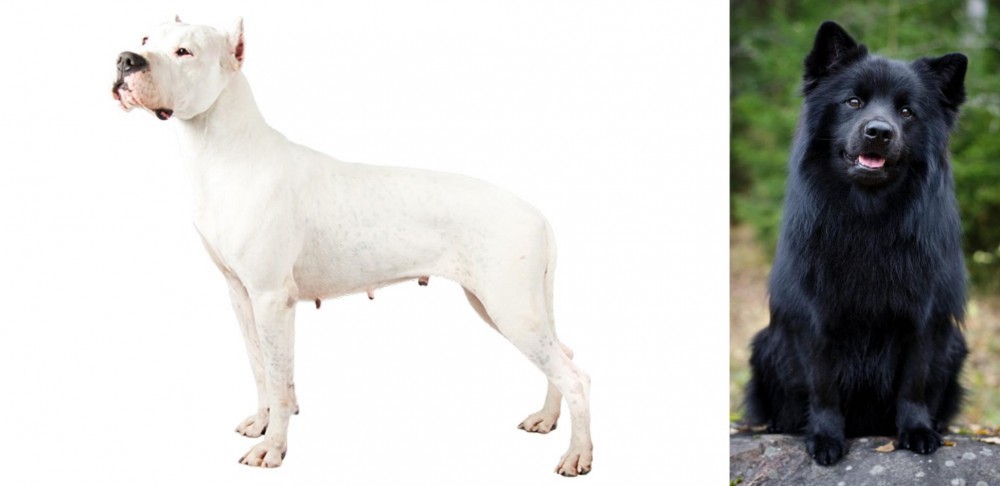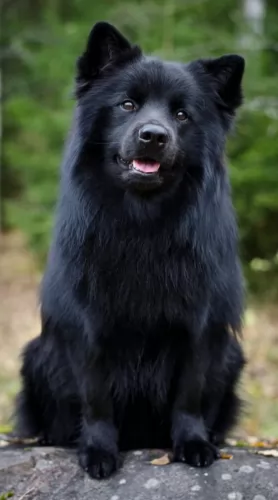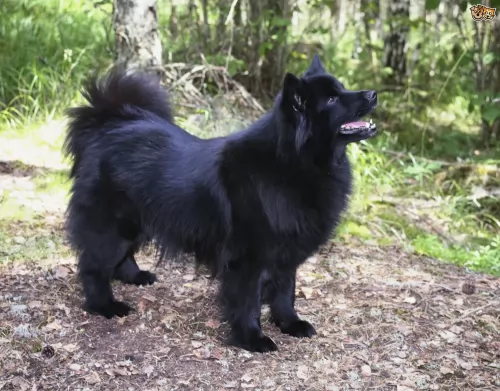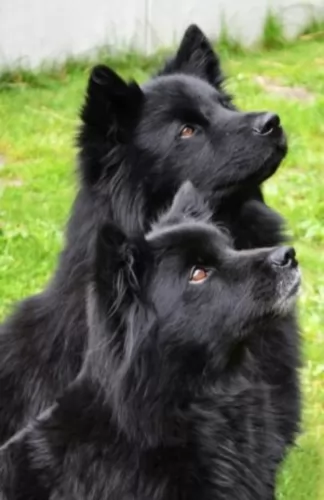 Petzlover
Petzlover Argentine Dogo is originated from Argentina but Swedish Lapphund is originated from Sweden. Argentine Dogo may grow 17 cm / 7 inches higher than Swedish Lapphund. Argentine Dogo may weigh 24 kg / 53 pounds more than Swedish Lapphund. Both Argentine Dogo and Swedish Lapphund has almost same life span. Both Argentine Dogo and Swedish Lapphund has same litter size. Argentine Dogo requires Low Maintenance. But Swedish Lapphund requires Moderate Maintenance
Argentine Dogo is originated from Argentina but Swedish Lapphund is originated from Sweden. Argentine Dogo may grow 17 cm / 7 inches higher than Swedish Lapphund. Argentine Dogo may weigh 24 kg / 53 pounds more than Swedish Lapphund. Both Argentine Dogo and Swedish Lapphund has almost same life span. Both Argentine Dogo and Swedish Lapphund has same litter size. Argentine Dogo requires Low Maintenance. But Swedish Lapphund requires Moderate Maintenance
 Known also as the Argentinian Mastiff, this large dog breed from Argentina is a descendant of the extinct Fighting Dog of Cordoba. People were looking for a fearless, companionable dog, and a man, Martinez from Argentina, began a selective breeding program to get a breed that wasn’t essentially geared to fighting.
Known also as the Argentinian Mastiff, this large dog breed from Argentina is a descendant of the extinct Fighting Dog of Cordoba. People were looking for a fearless, companionable dog, and a man, Martinez from Argentina, began a selective breeding program to get a breed that wasn’t essentially geared to fighting.
A number of breeds were mixed to achieve the desired characteristics in the Argentine Dogo breed.
It is unfortunate that the dog has been used for fighting and that it comes across as a dangerous dog so that today it is banned in several countries.
 This is a Spitz type of dog from Sweden. It is Sweden’s national dog.The dog has always been used for herding and guarding livestock such as reindeer for the Sami people.
This is a Spitz type of dog from Sweden. It is Sweden’s national dog.The dog has always been used for herding and guarding livestock such as reindeer for the Sami people.
The dog is much the same as the Finnish Lapphund, and some even believe that it might be one and the same. The American Kennel Club recognizes them as two separate breeds.
It is one of the oldest Swedish dog breeds and also one of 3 Lapphund breeds.The Swedish Kennel Club recognized the Lapphund as a distinct breed in 1903.
The Federation Cynologique Internationale recognized this dog in 1944, and the United Kennel Club in 2006.
 The Argentine Dogo is a striking looking dog, large, muscular and powerful looking. He stands at about 60 – 68cm and weighs about 35 – 45kg.
The Argentine Dogo is a striking looking dog, large, muscular and powerful looking. He stands at about 60 – 68cm and weighs about 35 – 45kg.
He has a pure white coat. The coat is short and smooth. The ears are high set and most times cropped and erect.The Dogo’s tail is long and hangs naturally.
The Argentine Dogo is a companion dog today who can be loving and loyal towards his human family. He is a strong willed dog with a distrust of strangers and other animals.
He will most certainly require training and socialization if you want him to behave well among people and animals. With proper training and socialization, he can make a good family pet.
 The Swedish Lapphund is a medium to large sized dog standing at between 40 to 51cm in height and weighing between 19 and 21kg.
The Swedish Lapphund is a medium to large sized dog standing at between 40 to 51cm in height and weighing between 19 and 21kg.
The head is wedge shaped and the ears erect. He has a thick double coat with fairly straight, silky hair that stands out from the body. Colors can be brown or black and sometimes there can be white markings. He sheds quite a bit, with some heavier seasonal shedding.
When you get one of these Spitz type dogs as your pet, you can be sure that you’re going to have an excellent pet and companion.
They’re independent dogs with strong wills and like to do their own thing. Training and socialization can change that and make him easy, well mannered and obedient.
They’re lively dogs and intelligent too. He is versatile, loving to be outdoors and being energetic with the children but being able to enjoy some quiet time indoors too. He is simply an excellent family pet and watchdog.
 This big, muscular white dog with his short white coat was once a hunting dog so he is active and energetic. He is also intelligent and courageous, loving his human family and wanting to protect them being a strong characteristic of his.
This big, muscular white dog with his short white coat was once a hunting dog so he is active and energetic. He is also intelligent and courageous, loving his human family and wanting to protect them being a strong characteristic of his.
The Argentine Dogo is social, strong, loyal and devoted and just wants to be part of his human family and all their activities. It is important that he is trained and socialized at an early age because then he is obedient and relaxed around people and pets in the home.
 The Swedish Lapphund has always been a hardworking dog, herding reindeer for the Sami people.
The Swedish Lapphund has always been a hardworking dog, herding reindeer for the Sami people.
Today the Lapphund is a people-loving dog and wants to be constantly with his human family. He is intelligent, strong, independent, loyal, bold and loving. If you’re looking for an excellent family companion, this is it.
Do him a favor and don’t leave him outside without human companionship as he will become run-down and possibly destructive through no fault of his own. Bring him into your family and make him part of it and then he’s happy.
 The Argentine Dogo can live to be between 10 and 12 years of age if he is looked after well, however about 10% of Argentine Dogos suffer from pigment-related deafness in one or both ears.
The Argentine Dogo can live to be between 10 and 12 years of age if he is looked after well, however about 10% of Argentine Dogos suffer from pigment-related deafness in one or both ears.
A dog can lose it’s hearing because of an ear infection. That is why it is so important to watch your pets ears and make sure that the ears aren’t red and that your pet isn't continually scratching his ears.
The most common cause of congenital deafness with a dog is pigment-related. Dogs with white coats are often affected by deafness and you commonly see deafness in dogs with white pigmented skin because they carry the piebald gene – the white coat and often blue eyes. Without a particular stem cell, the white dog’s body isn’t able to make a special layer of hearing cells.
There is a high rate of hip dysplasia with these dogs and more than 40% of Argentine Dogos have malformed hips. This isn’t a dog ailment to take lightly as it can lead to pain, discomfort and even lameness for your pet.
Skin diseases such as red, itchy allergies are also common with these dogs as well as eye diseases.
 The Swedish Lapphud is a healthy dog breed, but even so he can get one of the many common dog illnesses there are.If you choose a puppy, make sure to get your pet from a reputable breeder to avoid more serious dog illnesses.
The Swedish Lapphud is a healthy dog breed, but even so he can get one of the many common dog illnesses there are.If you choose a puppy, make sure to get your pet from a reputable breeder to avoid more serious dog illnesses.
Diabetes Mellitus is a disease you might have to watch out for with this dog breed.
This is a disease of the pancreas. This organ has two groups of cells – one produces enzymes for proper digestion and the other produces the hormone insulin which regulates the level of glucose in the bloodstream.
Diabetes is when the pancreas fails to regulate blood sugar. Your dog will have increased thirst and urination, weight loss, and increased appetite.
Type I diabetes mellitus results from destruction of the insulin-producing beta cells, which is the most common type of diabetes in dogs. Dogs with this type of diabetes require insulin injections to stabilize blood sugar. Type II diabetes is more likely in older, obese dogs.
Dogs with diabetes mellitus will require insulin each day. If canine diabetes mellitus is properly regulated, prognosis for the dog is good.
 With his short coat, the Argentine Dogo is a low maintenance dog, requiring a good brush twice a week. Its a pure white dog, and wiping him down with a damp cloth can keep his coat looking dazzling white and clean.
With his short coat, the Argentine Dogo is a low maintenance dog, requiring a good brush twice a week. Its a pure white dog, and wiping him down with a damp cloth can keep his coat looking dazzling white and clean.
Grooming your dog like this gives you a good chance to also check your pet for fleas and ticks and to ensure the skin is free from infection or dryness. You will find that he sheds a bit more in the hotter seasons, but during the colder months it will be wise to bring your pet indoors.
Other areas to consistently check with your dog are his nails – to keep them trimmed, to clean his teeth 2 or 3 times a week with proper canine toothbrush and toothpaste and to check his ears for infection.
 ●The Swedish Lapphund is an active dog and will require a high quality dog food. If you buy commercially manufactured dog food it should be appropriate to your dog’s age and activity levels.
●The Swedish Lapphund is an active dog and will require a high quality dog food. If you buy commercially manufactured dog food it should be appropriate to your dog’s age and activity levels.
Home-made food like boiled chicken, brown rice, spinach and sweet potatoes will do your pet the world of good, and chopped up, it can be added a couple of times a week to the dog’s dry kibble.
Try and feed some raw met occasionally as well. Clean, fresh water should be available at all times.
●The Lapphund is an active dog and he is going to reguire daily exercise that will keep him mentally and physically fit. Having a dog like this requires you being active yourself, and your Lapphund is going to love going on long walks or hikes. He will never get enough games with the children – he just loves the rough and tumble.
● Have his vaccines attended to. There are training classes as well as boarding kennels that won’t accept your dog unless his vaccines are up to date.
● Have your dog spayed or neutered if you don’t want your dogs to have puppies.
● Brush his coat twice a week. Check inside his ears and inside his mouth for redness and infection.